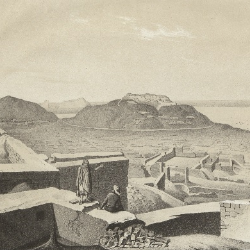
What meanings has archaeology assumed in cultural and critical theory? What has been its role as a metaphor and also a mechanism for producing knowledge in humanistic discourse? This symposium seeks to map the differences and similarities between archaeological interventions and the way those interventions have been taken up as analytic, metaphor, and discursive strategy.
Thursday October 24
5:00 - 6:30 pm
speakers:
Ximena Briceño (Stanford University), Dust to Dust: Visual culture, material remains, and the futures of the past
Peter Fenves (Northwestern University), At the Origin of Critical Theory: Benjamin Excavating the Concept of Time in Pre-Colonial Mesoamerica
moderator: Jorge Coronado (Northwestern University)
full symposium schedule
Thursday October 24
5:00 - 6:30 pm
speakers: Peter Fenves (Northwestern), Ximena Briceño (Stanford)
moderator: Jorge Coronado (Northwestern)
6:30 pm - reception
Friday October 25
9:00 - 9:30am - coffee, light breakfast
9:30 am - 11:00 am
speakers: Andrew Hamilton (School of the Art Institute) and Mary Weismantel (Northwestern), Roberto Rosado (Northwestern)
moderator: Sophie Reilly
11:15 am - 12:45 pm
speakers: Alexander Herrera Wassilowski (Universidad de los Andes), Walther Maradiegue (Northwestern)
moderator: Daniela Raillard (Northwestern)
12:45 - 2:15 pm lunch
2:15 - 3:45 pm
speakers: Gabriel Ramón Joffré (Pontificia Universidad Católica del Perú), Jorge Coronado (Northwestern)
moderator: Mark Hauser (Northwestern)
co-sponsored by the Latin American & Caribbean Studies Program (LACS), the Center for Native American and Indigenous Research (CNAIR), the Department of Spanish & Portuguese, the Department of Anthropology, the Science in Human Culture Program, and the Department of German
Audience
- Faculty/Staff
- Student
- Post Docs/Docs
- Graduate Students
Interest
- Academic (general)